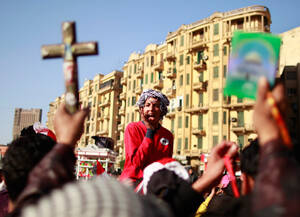The consequences of the Arab Spring were considered during a seminar in Brussels on May 9, convened jointly by the Commission of the Bishops’ Conferences of the European Union and conservative blocs from the European Parliament. It was “a very bitter truth” that “democratization of the Middle East does not bring relief to the people who live there,” said Konrad Szymanski, a member of the European Parliament from Poland. He said that if the European Union wishes to remain credible on human rights, it “has to take a clear stance in defense of Christians in the Middle East.” The Rev. Joe Vella Gauci of Malta, representing the bishops’ commission, called the Arab Spring a crucial historical paradigm shift. He worried, however, that positive developments are “overshadowed by barbarous incidents.” A fundamental outcome of Arab democratization, he said, should be “respect for all citizens; the elimination of parallel societies; respect for diverse communities and cultures; and the creation of socio-political systems worthy of safeguarding human rights and democratic values.”
'Arab Spring' Evaluated
Show Comments (
)
Comments are automatically closed two weeks after an article's initial publication. See our comments policy for more.
The latest from america
Nothing in my life has been as freeing as the realization that not everyone is going to love, like or approve of me.
As hundreds of Catholic content creators descend on Rome for the Jubilee of Digital Missionaries and Catholic Influencers, it’s worth asking: What’s the best way to evangelize online?
The editors of 'America' have been opining on what you should read for over a century. Some of their suggestions have aged better than others.
On Tuesday, Pope Leo XIV addressed a crowd of digital missionaries and Catholic influencers about the responsibilities and challenges of their ministry.








